Your Name Review - Unforgettable
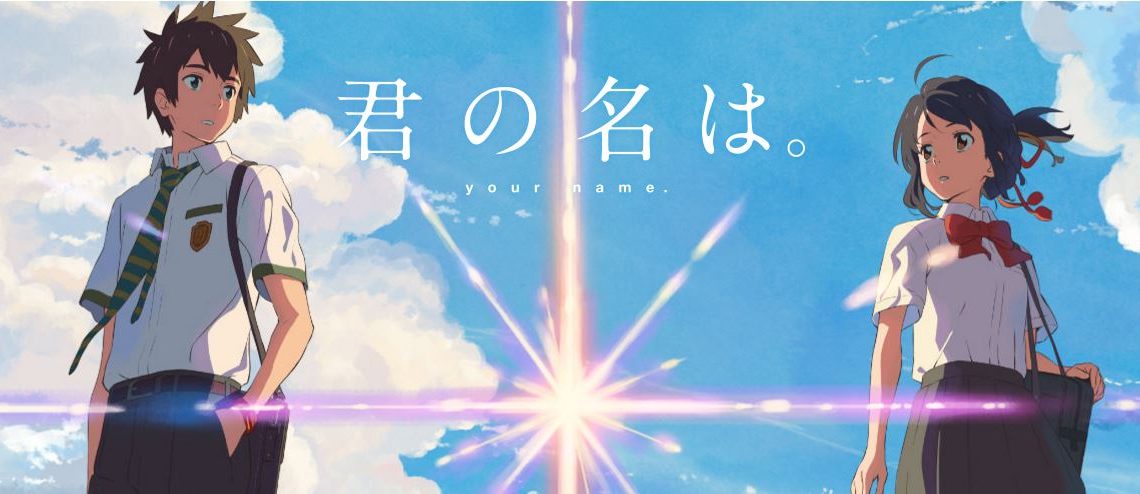
Before you read any further, consider this your one and only warning that the following review is going to contain spoilers. Quite a few of them. However, aware as I am that flag can turn people off from this review, I’m willing to compromise. The problem is I can’t give this film the thorough dissection it deserves without having to give away the Act 2 plot twist, because that’s the point where the entire tone, theme and story in general switches gears and almost turns into an entirely different film altogehter, so what I’m going to do is chop this review into two sections. For part one, I’m going to try to stick to only Act 1 developments and information, so if you haven’t seen this film yet but it’s on your to-do list and you want to know what you’re getting into, then there’s no need to worry. Part two will talk about everything that happens after that aforementioned twist (don’t worry, I’ll let you know when we get there), and if you want to keep the second half or so of the movie fresh, that’d be the part to skip.
For those who just don’t want spoilers period and just want to hear what I think of Your Name, here it is: this might be one of the best anime movies I’ve ever seen.
No, I’m deathly serious. I don’t praise something as being the “best” unless it actively does something to impress me and doesn’t let off the gas for anything. To give you an idea of what I like, Studio Ghibli provides nicely animated and thought-provoking stories that are simple enough for younger viewers to follow and meaty enough for us adults to analyze in long-winded blog posts on the internet. Meanwhile, Mamoru Hosoda and the rest of the Studio Chizu crew are yet to put out a film with writing that didn’t make me either bawl my eyes out with laughter or put me on the verge of tears, often both at once.
Your Name, however, does all of those things at once. Flawlessly. The animation is stellar. The writing and voice acting are all top notch. The characters are engaging, the plot warms up at the perfect rate so as to help the audience connect with them better, and holy hell it’d probably be easier for me to list things in this movie that didn’t stun me. I mean, in the wake of Ghost in the Shell getting mixed reviews as a Westernization of an anime classic, Your Name is easily the go-to movie this spring if you want a satisfying fix of theatre class anime.
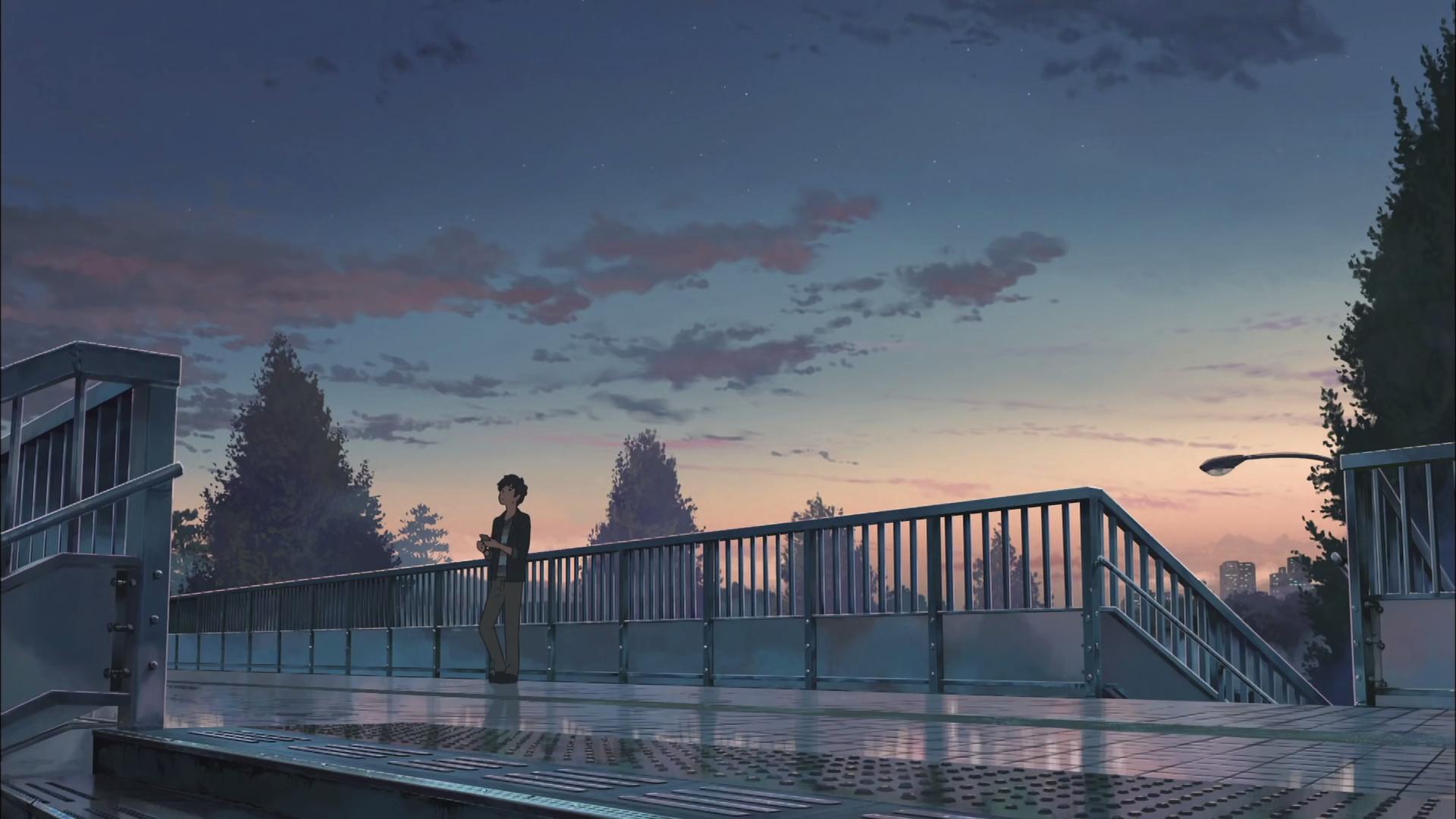
The things we do for cell reception.
The story opens up with our female lead Mitsuha (Mone Kamishiraishi/Stephanie Sheh), a high-school student dreaming of leaving her rural backcountry town someday to move to Tokyo. As we find out during her talks with family and friends, she has been acting strange on and off lately, mostly due to her supernaturally swapping bodies with our male protagonist Taki (Ryunosuke Kamiki/Michael Sinterniklaas), who actually does live in Tokyo, nicely enough. Since whatever memories the two have disappear when they go back to their original bodies, and whatever shenanigans they get up to during that time actually affects the other’s life, they start exchanging notes with each other, and eventually Taki sets out to find Mitsuha and meet her in person.
The plot’s in a similar vein to something like Freaky Friday, and when you think about it, that’s kind of a hard routine for a movie to execute. The voice actors especially need to be on point, because they need to convey the range of not just one character trying to live an average, everyday life, but also a second character with their own personality quirks who would be understandably taken aback by routinely appearing in a body not their own. Major props must be given to the voice actors in this production for their confident and convincing line delivery as well as successfully handling the sheer range of emotions they had to convey in the process.
Helping matters even further is the movie’s spectacular art and animation quality. Mitsuha’s lakeside town in particular I found to be especially compelling, as even though the large-scale panoramic shots of the lake and its surroundings give it an appealing, welcoming feel, the shots of the inner town make it feel sparse, uninteresting, and as Mitsuha frequently reiterates herself, empty. Her home seems like it would make a decent resort for a weekend camping trip or long weekend, but after living in the town for most of her life, a town that her dad happens to be mayor of (we’ll dig into that in a minute), then considering there’s nobody else to meet or anything else to see, it’s understandable that she gets fed up with the country life altogether and wants to get out to the city for just the sake of variety if nothing else.
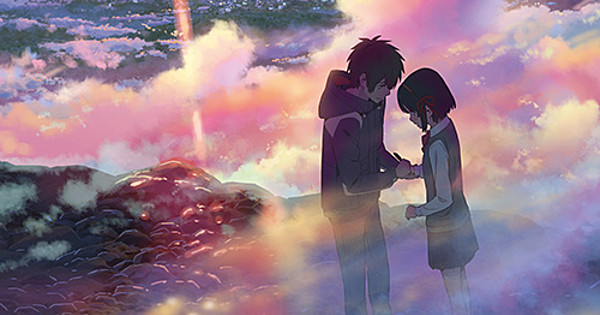
For as we all know, a cold mountaintop is the best spot to get a number.
Meanwhile, Taki’s world falls victim to an entirely different flavor of boredom, that being his life at present is so monotonous and humdrum to the point where he doesn’t really see the point in breaking out of his daily routines. The only hook that’s even slightly noteworthy is his senior at the restaurant he works at is crushing on him, and in the end it’s actually Mitsuha who ends up getting the two together.
So what we have is two main characters who are escaping their droning everyday lives just to live a day in someone else’s droning everyday life, which is ironically the most exciting part of their droning everyday lives. And if that doesn’t sound like an excellent allegory on the human condition, with emphasis just how badly we as a species need a healthy dose of variety, adventure and connection lest we sink into our bland one-note lives and turn into another face in an immense, nameless crowd, then clearly you didn’t read the past few paragraphs all the way.
The first part of this movie is full of witty dialogue, colorful and unique characters, and just gorgeous animation like I mentioned previously. What the movie is really doing behind the curtains, however, is setting up the main plot driving force that will spur the rest of the film’s action. In that sense, the movie’s pacing also has to be praised. Both Taki and Mitsuha are likable and inherently interesting characters, and using the first twenty minutes or so of the movie to fully develop their unusual relationship was a very good call on the screenwriters' part. The logic was presumably that the scenes had to be included anyway to establish the story’s background, so why not go all the way and flesh out our leads as much as possible while we’re doing that?
Your Name leaves a superb first impression and the rest of the movie only gets better from there. Regrettably, this is also the point where I have to talk about the aforementioned big twist, so if this is where you stop reading, go out and see this movie. I may have provided a sampler of what you may be in for, but words don’t come close to describing this film at all. It needs to be seen directly to be fully appreciated.
For the rest of you… (last call, major spoilers incoming)
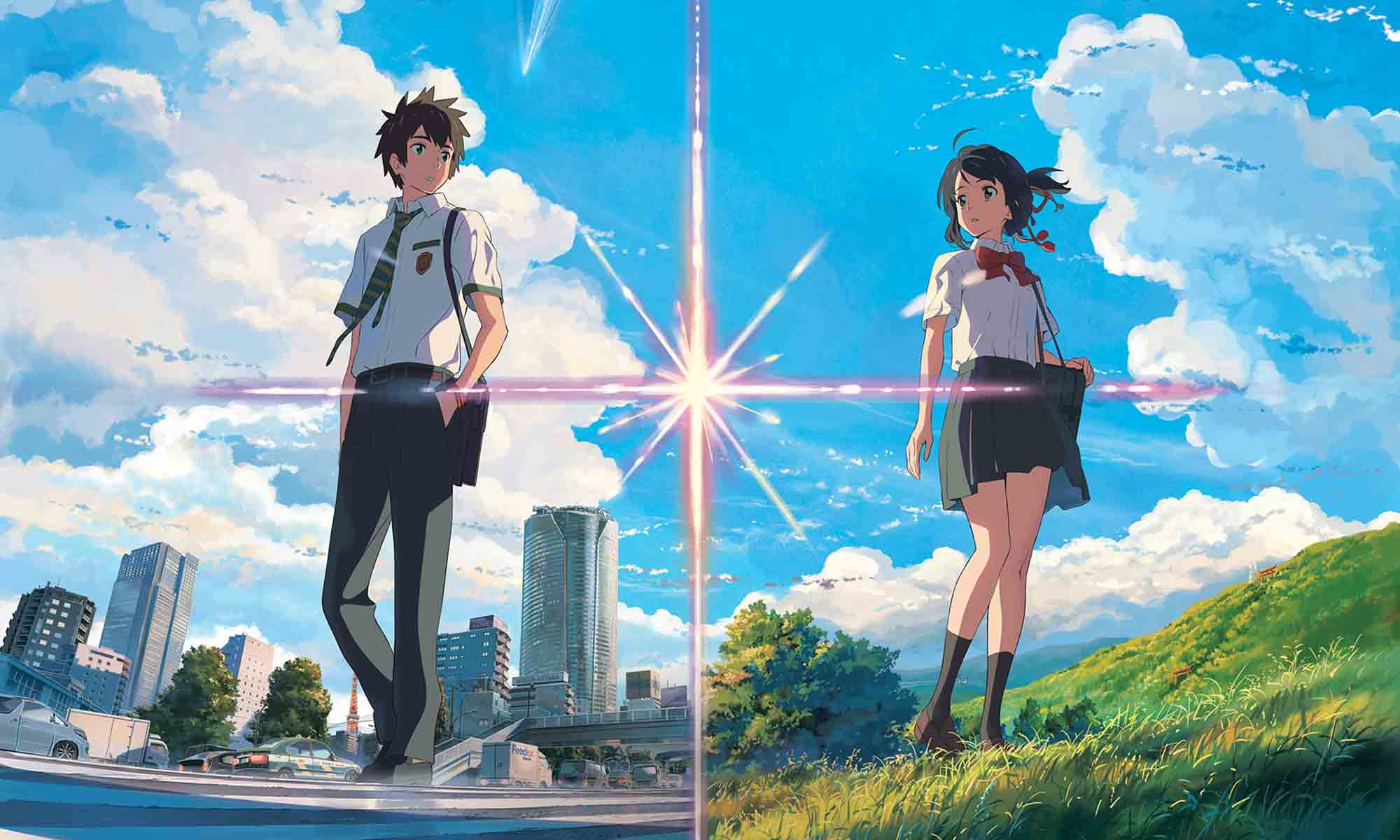
So Taki sets out to find Mitsuha and try to connect with her personally, with only a sketch of her hometown to guide him along. He finally does arrive at the town, only to realize that not only was it wiped off the map by a falling meteorite three years ago, but also that one of the casualties in the accident was Mitsuha herself.
Ouch.
What that pretty much means for the story is that Taki was not only switching bodies with Mitsuha, he was also travelling back in time and experiencing the events leading up to the accident firsthand. And this is kinda why I wanted to talk about this, because the instant this twist hits the entire tone of the movie changes from a cleverly written body-swapping comedy to a genuinely touching, profound and thought provoking drama.
The concept of memory comes up very frequently in this movie, and its primary purpose is to provide motivation for our leads to literally bend time and space and rewrite history in order to finally meet each other. The tragedy of it all comes in the fact that Taki can never remember anything about the experiences he has with Mitsuha, not even her name, which in normal relationships, even those that die over time, would be a thing that most people wouldn’t forget. The movie extends that by saying the things we do in life aren’t nearly as important as the people we do them with, and using memory as a motif for conveying that message serves to amplify it in context.
I found the second half of the movie to be extremely powerful in its delivery, and I like to think that is mostly if not entirely due to the characterization of our leads which takes up the bulk of the first half. Although there’s probably a parallel universe where Your Name’s second half is extended out to the full runtime, and it’s still a good movie, I think the approach taken by Makato Shinkai here was the best way to handle the story and plot development. What makes this movie so endearing is that it’s not all drama all the way through. Since we get plenty of time to get attached to the main characters and understand that their wanting to be together isn’t just some contrived reason for them to act the way they do, that lets the story develop more organically, which in turn provides us with a much more satisfying experience.
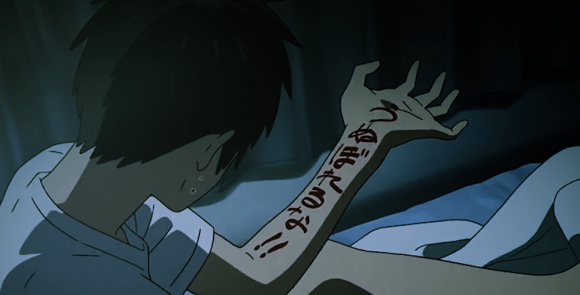
Don’t you just hate it when someone doodles on your arm during the night?
There is so much to recommend about Your Name that it would be a disservice to actually type out everything I liked about it. This is a film that needs to be witnessed firsthand in order to be fully appreciated. Your Name is one of the most beautiful films I’ve seen, on both an artistic and literary level. It’s a charming, heartwarming, ultimately riveting tale of meaningful relationships, loss of said relationships, and how we remember people. All of this is conveyed through well-written dialogue, downright gorgeous animation, and a premise that makes the film stand out as its own unique piece of work.
One of my friends best summed up the show as follows: “What happens when we give a movie all the budget?”
Your Name’s response seems to be, “What happens is you get a really damn good movie out of it.”
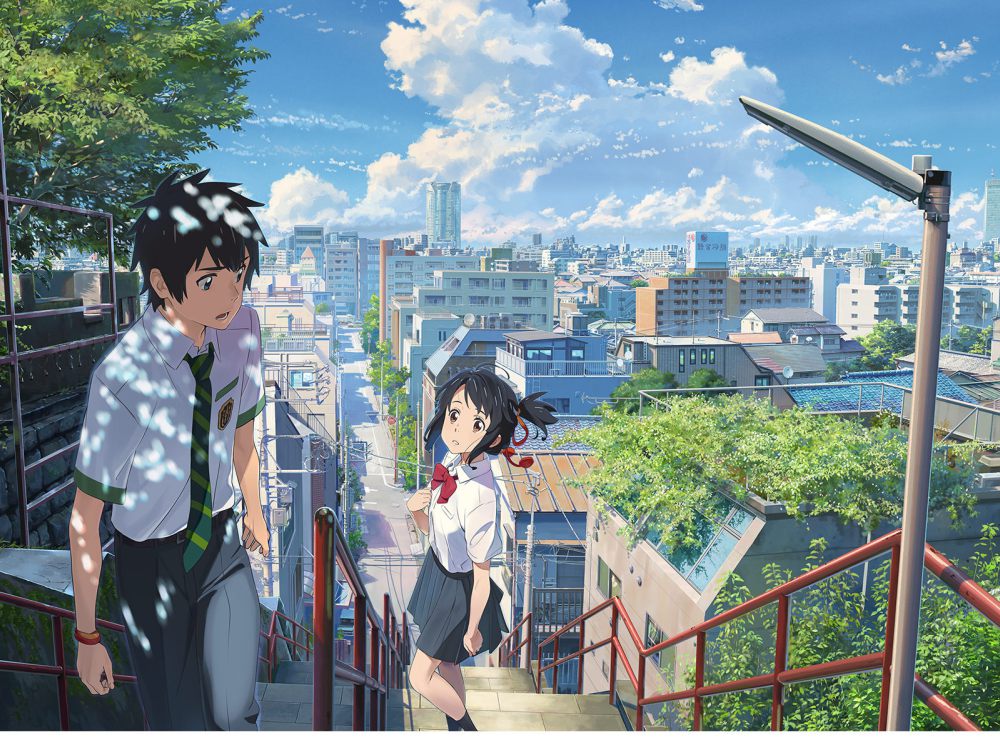
THE VERDICT: A+
Next time: Another nitpick-fest of a spectacularly bad show.